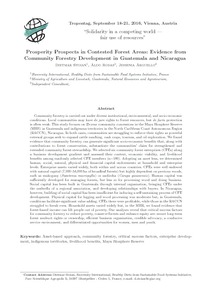Silvicultura comunitaria
AGROVOC URI:
Poverty and forests: multi-country analysis of spatial association and proposed policy solutions
This paper examines poverty and deforestation in developing countries as linked problems and focuses on policies that can favour poverty alleviation in forested regions. The paper encompasses two elements: analysis of the spatial coincidence between poverty and forests, and proposed policy options for reducing poverty in forested areas.
Poverty and forests: multi-country analysis of spatial association and proposed policy solutions
This paper examines poverty and deforestation in developing countries as linked problems and focuses on policies that can favour poverty alleviation in forested regions. The paper encompasses two elements: analysis of the spatial coincidence between poverty and forests, and proposed policy options for reducing poverty in forested areas.
Prosperity prospects in contested forest areas: evidence from community forestry development in Guatemala and Nicaragua
Tropentag, September 18-21, 2016, Vienna, Austria
“Solidarity in a competing world —
fair use of resources”
Prosperity Prospects in Contested Forest Areas: Evidence from
Community Forestry Development in Guatemala and Nicaragua
Dietmar Stoian
1
, Aldo Rodas
2
, Jessenia Arguello
3
1
Bioversity International, Healthy Diets from Sustainable Food Systems Initiative, France
2
Ministry of Agriculture and Livestock, Guatemala, Natural Resources and Agrotourism,
3
Quem é mais importante? A avaliação do bem-estar humano no manejo florestal sustentável
Who counts most? Assessing human well being in sustainable forest management presents a tool, 'the Who Counts Matrix', for differentiating 'forest actors', or people whose well-being and forest management are intimately intertwined, from other stakeholders. The authors argue for focusing formal attention on forest actors in efforts to develop sustainable forest management.
Promoting forest conservation through ecotourism income?
A principal criterion for classifying a tourism operation as 'ecotourism' is that local residents at the site should receive substantial economic benefits, which serve both to raise local living standards and as enhanced incentives for nature conservation. This paper sets out a methodological framework for analysis of the alleged participation-income-conservation link, and applies it to the Cuyabeno Wildlife Reserve in the Ecuadorian Amazon region.
Property rights and participatory forest management: an overview
This paper is an overview of participatory forest management in relation with property rights issue. It highlights the difficulty in defining property rights. Although the issues presented are applicable throughout tropical Asia, albeit less so in the Pacific, this paper is based primarily on the author's experience in Indonesia, and almost all of examples are from indonesia. This paper discuss the diversity and changing nature of property rights and continues with a discussion on the issue of communities demanding the rights and possible responses of the government.
Proses pembelajaran (learning lessons) promosi sertifikasi hutan dan pengendalian penebangan liar di Indonesia: September 2003 sampai June 2006
Rates and causes of deforestation in Indonesia: towards a resolution of the ambiguities
There have been several major research efforts on the rate and causes of Indonesia's deforestation in recent years and much associated literature, but there is still no consensus in the research community on these issues. This paper reviews the areas of uncertainty and confusion, and proposes questions that must be answered to get a better grasp of the subject. Among the key questions are: (1) How are we to define "forest", "deforestation" and "agency” in the context of Indonesia?


